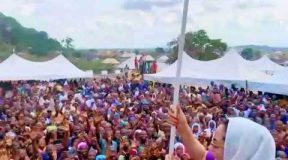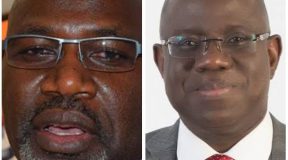Justice James Omotosho of the Federal High Court sitting in Abuja on February 23, 2024, overruled a motion on notice filed by Ali Bello and Dauda Suleiman urging the court to strike out the 17-count amended charge filed by the Economic and Financial Crimes Commission, EFCC on the ground that the charge lacked merit and invalid.
The court held that the 17-count amended charges filed on February 5, 2024, are valid as the prosecution is entitled to amend its charges provided it is done before judgment day.
The motion on notice by the defence which was filed on February 22, 2024, by counsel to the second defendant, Nureini Jimoh, objected to the admittance of the amended charges stating that it amounted to an abuse of court processes. Also, the motion questioned the jurisdiction of the Federal High Court sitting in Abuja to try the matter and therefore sought that the matter be transferred to Kogi State. Jimoh also submitted that the 17-count amended charge was fatally incompetent, citing Section 216 of the Administration of Criminal Justice Act 2015.
“My lord, the EFCC lacks the grounds to investigate the revenue of Kogi State Government, because the EFCC is not constitutionally recognized to have the powers to usurp the decision and powers of Kogi State House of Assembly. Let me say that based on the resolution and decision by the Kogi State Assembly, which says that no fraud was committed in the Kogi State Account, that should lay to rest EFCC’s allegation that a fraud was committed” Jimoh said.

Responding, Prosecution Counsel, Rotimi Oyedepo, SAN, in a counter- affidavit objected to the allegations, urging the court to discount the application of the defense. He noted that the alleged offense was committed by the defendants in Abuja and “within the jurisdiction of the Honourable Court and all three witnesses in the case are residents of Abuja”. He also pointed to the insecurity challenges involved in prosecuting the matter in Kogi State.
“We are opposing the application with a counter- affidavit and we urge my Lord to dismiss this application. In the circumstances that offenses were committed in Abuja, the funds alleged to have been laundered belong to the Kogi State government, but the alleged money laundering act was committed in Abuja and the funds in question had been allegedly used to acquire properties and equally used to engage in foreign exchange transactions in Wuse Zone 4, Abuja. My Lord, I will rely on Section 20 of the Money Laundering Prohibition Act 2011″, he said.
Delivering his ruling, Justice Omotosho discountenanced the application of the defense, stating that the prosecution has not concluded its case, “so it is immature to say that the EFCC cannot amend charges at any time before judgment”.
He also stated that the EFCC under its Establishment Act has the power to investigate and prosecute anybody or entity when cases of corruption and money laundering are established including the powers provided by the Money Laundering (Prohibition) Act 2011.
“Prosecuting a money laundering charge is within the purview of the EFCC. I hold that this criminal trial is properly constituted before this court. I also hold without hesitation that the second amended charge filed on February 5, 2024, is hereby deemed valid and competent. I hereby order that the defendants are called upon to take their pleas in the amended charge, the objection of the defendant is hereby overruled”, he ruled.
While promising an accelerated hearing of the case, the Judge added that insecurity could be a reason to try a criminal offense outside the jurisdiction
Justice Omotosho therefore adjourned to March 14, 15, and 21 for the continuation of the hearing.





